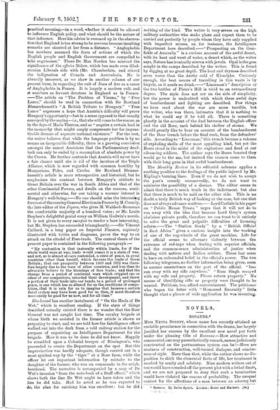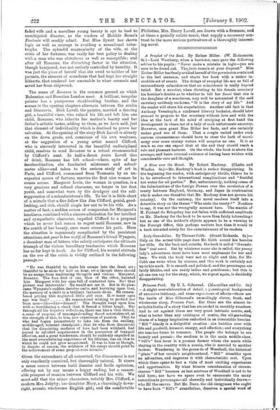NOVELS.
ROSANNE.*
Miss Nrrra. SvaErr, whose name has recently attained an enviable prominence in connection with the drama, has largely justified her success by the excellent new novel put forth under the pleasing title of Rosanne.—How attractive and ornamental, one may parenthetically remark,names judiciously constructed on the portmanteau system can be !—Here are neatness of construction, well-turned dialogue, and concise- ness of style. More than that, while the author shows no dis- position to shirk the elemental facts of life, her treatment is marked by sanity and sobriety. Nine modern writers out of ten would have rounded off the present plot with a lethal finale, and we are not prepared to deny that such a termination would have violated the canons of probability. The unequal contest for the affections of a man between an adoring but • Rosanna. By Netts Byrett. London: Hurst and Blacken. [6..] faded wife and a merciless young beauty is apt to lead to unmitigated disaster, as the readers of Matilde Serao's Fantasia will readily admit. But Miss Syrett has shown
logic as well as courage in avoiding a sensational catas- trophe. The splendid magnanimity of the wife, at the crisis of her fortunes, was really her best policy in dealing with a man who was chivalrous as well as susceptible; and after all Rosanne, the disturbing factor in the situation, though hampered, was not entirely controlled by heredity. It was just the piece of herself that she owed to neither of her parents, the element of soundness that bad kept her straight hitherto, that rendered her amenable to wiser counsels and saved her from shipwreck.
The scene of Rosanne is the common ground on which Bohemian and Boeotian London meet. A brilliant, irregular painter has a prosperous stockbroking brother, and the scenes in the opening chapters alternate between the studio
and Stuc,covia. Dick Lavell, the painter, married a dancing girl, a beautiful vixen, who ruined his life and left him one child, Rosanne, who inherits her mother's beauty and her .father's artistic tastes, adding to them, as we have said, just that element of individuality which is destined to prove her 'salvation. At the opening of the story Dick Lavell is already on the down grade, and, conscious of his own weakness, at the suggestion of a young artist named Clifford, who is sincerely interested in the beautiful undisciplined child, resolves to send Rosanne to a school recommended by Clifford's aunt. In half-a-dozen years Lavell dies of drink, Rosanne has left school—where, spite of her insubordination, she fascinated mistresses and school- mates alike—and taken to the serious study of art in Paris, and Clifford, summoned from Tasmania by an un- expected access of fortune, marries the first nice woman be comes across. Margaret Irwin, the woman in question, is a very gracious and refined character, no longer in her first youth, and somewhat worn by the drudgery and the self- suppression of a schoolmistress's life. To her it is little short of a miracle that a fine fellow like Jim Clifford, genial, good- looking, and rich, should single her out to be his wife. As a matter of fact, a sudden access of compassion for Margaret's loneliness, combined with a sincere admiration for her intellect
and sympathetic character, impelled Clifford to a proposal which he never had reason to regret until Rosanne, now in the zenith of her beauty, once more crosses his path. Here the situation is ingeniously complicated by the persistent attentions, not pour le bon motif, of Rosanne's friend Wyngate,
a decadent man of letters, who calmly anticipates the ultimate triumph of the vicious hereditary tendencies which Rosanne has so far kept in leash. As for Clifford, his mental attitude on the eve of the crisis is vividly outlined in the following passage :—
"He was thankful to make his escape into the fresh air ; thankful to be alone for half an hour, ev. n though there should be no escape from maddening thoughts and visions. Margaret, Rosanne. The face first el one, then of the other, haunted him. Margaret with her eyes full of contented love. No! that picture was intolerable ! He would not see it. But in its plect,i came Wyngate's sudden derisive smile, and hurrying upon that the memory of a child in a brilliant fantastic dress. He remem- bered pitying this neglected little girl once. How many ages
ago was that ? He remembered wishing to protect her
from ! The thought leapt upon him with so bewildering a shock that it forced a bitter laugh. But through all his hopeless reflections, there ran like a thin thread, a sense of surprise, of uncompreh.nding dazed astonishment, at the strength of this, to him, new experience of passion. That he
who had begun prematurely to take life from the smiling, middle-aged, tolerant standpoint ; that he who, from discontent that the disquieting madness of love had been withheld, had passed to satsfied acquiescence in the possession of tranquil affection, and a great tenderness, should be suddenly engulfed in the most overwhelming experience of his lifetime, was an idea to which he could not grow accustomed. It was to him as though, in despite of reason, the evidence of his senses should point to the achievement of some prepcsterous miracle."
Given the antecedents of all concerned, the denouement is not only excellently contrived, but thoroughly natural. It steers a mean course between lurid disaster and facile optimism,
offering not by any means a happy ending, but a reason- able prospect of reunion between Clifford and his wife: We must add that the minor characters, notably Mrs. Clifford, a modern Mrs. Jellyby; her daughter Mary, a charmingly down- right, prosaic. wholesome English girl; and the comfortable Philistine, Mrs. Henry Lavell, are drawn with a firmness, and at times a genially satiric touch, that supply a necessary con- trast to the more serious portraiture of a thoroughly interest- ing novel.











































 Previous page
Previous page